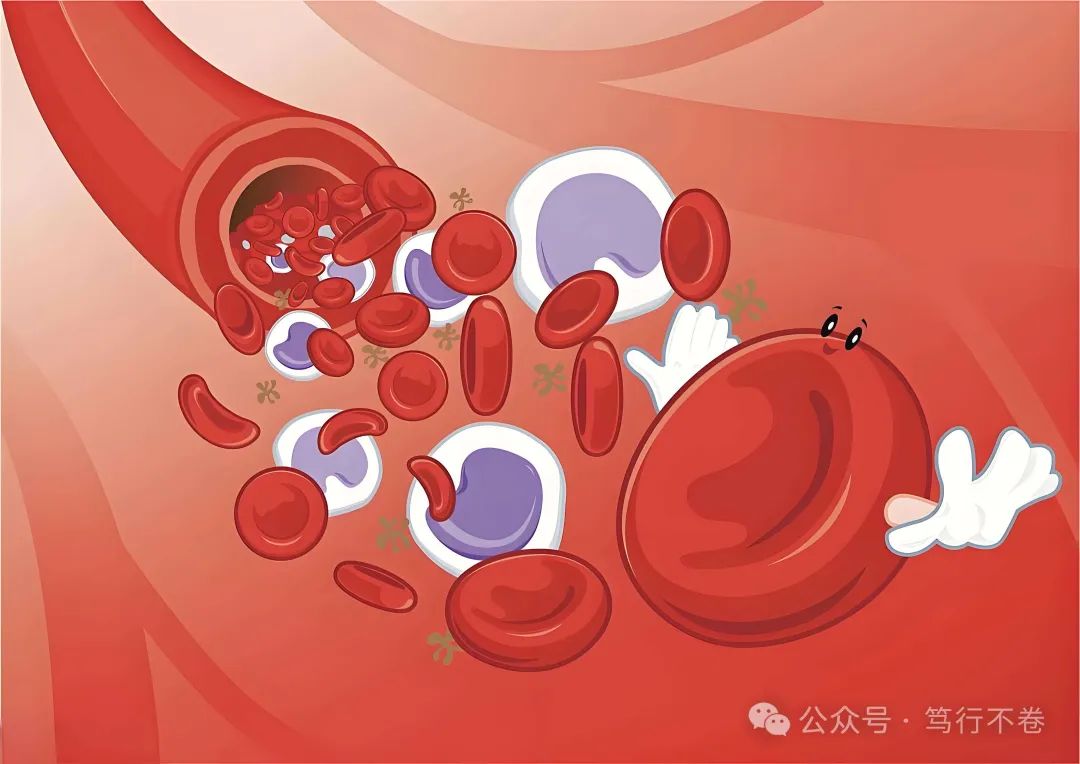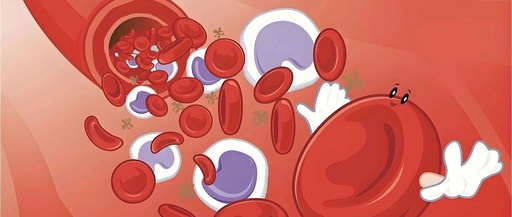Today, we will explore the extremely important concept of “blood” in Traditional Chinese Medicine (TCM). Blood is the red liquid that flows through our blood vessels, providing nourishment and moisture to the entire body, much like the body’s “nutrient fluid.”
The Suwen: On Regulating the Menstrual Cycle states: “What a person possesses are blood and qi.” This highlights the significance of blood in our health.

Blood must flow normally within the blood vessels to function effectively.
If the flow is slow or blocked, it becomes yu xue (stagnant blood); if it leaks outside the blood vessels and is not addressed promptly, it can also turn into yu xue, endangering health.
Generation of Blood
Blood is generated from the essence of food and water (shui gu zhi jing) and kidney essence (shen jing). Many organs work together to ensure sufficient blood production.
Material Basis
- Shui gu zhi jing (essence of food and water) is crucial; the spleen and stomach transform ingested food into refined substances, with ying qi (nutritive qi) and jin ye (body fluids) being the main components of blood.
- Shen jing (kidney essence) is also an important source for blood generation; the kidneys store essence, which can produce marrow, and marrow can transform into blood. Kidney essence also supports liver blood.
Related Organs
- The spleen and stomach are the source of blood production; if they do not function well, blood will be insufficient, so nourishing blood requires first regulating the spleen and stomach.
- The kidneys and liver are also important; sufficient kidney essence provides a source for blood; the liver stores blood, and the transformation between essence and blood means that deficiency in the liver and kidneys can affect blood generation.
- The heart and lungs also participate; the refined substances from the spleen and stomach must rely on heart qi to transform into blood and must merge with the clear qi inhaled by the lungs to become blood.
In summary, the generation of blood relies on shui gu zhi jing and shen jing, with the function of the spleen and stomach being particularly important, while other organs must also cooperate effectively.
Circulation of Blood
Blood circulates in the blood vessels and is influenced by many factors.
Influencing Factors
- Qi is crucial; it can push blood along, keep it warm, and control its movement. If blood circulation is abnormal, one must first regulate qi.
- The blood vessels must be intact and unobstructed; otherwise, blood cannot flow smoothly.
- The cleanliness of the blood also matters; if it is too dirty or thick, it can easily become blocked.
- Pathogenic factors can also disrupt circulation; heat pathogens cause blood to move chaotically, while cold pathogens cause blood to coagulate.
Related Organs
- The heart governs the blood vessels and is the driving force for blood circulation; sufficient heart qi ensures strong blood flow.
- The lungs assist the heart in circulating blood throughout the body, regulating the movement of qi to promote blood circulation.
- The liver regulates the movement of qi, stores blood, and adjusts blood volume to ensure normal circulation.
- The spleen can control blood within the vessels, and the liver’s storage of blood can prevent bleeding.
These organ functions must coordinate for blood to circulate normally; any dysfunction in an organ can lead to abnormal blood flow.
Functions of Blood
Nourishing Function
Blood acts like the body’s “nutritionist,” nourishing all parts of the body.
When blood is sufficient, the complexion is rosy, muscles are firm, skin and hair are lustrous, sensations are sharp, and movement is agile.
When blood is insufficient or its nourishing function is poor, organ functions decline, the complexion becomes pale, muscles thin, skin becomes dry, hair becomes brittle, limbs feel numb, and there is a lack of strength.
Spirit Nourishing Function
Blood is also the “fuel” for mental activities; when blood is abundant, the spirit is good, the mind is clear, sensations are acute, and thinking is quick.
When blood is low or circulation is abnormal, mental health deteriorates, leading to insomnia, forgetfulness, vivid dreams, palpitations, irritability, and even confusion.
TCM Methods for Nourishing Blood
TCM offers a variety of methods for nourishing blood, emphasizing holistic regulation through diet, herbal medicine, and lifestyle interventions to improve blood deficiency and promote health. These methods are based on TCM theory, stressing individualization and pattern differentiation to provide effective pathways for blood nourishment.
Dietary Regulation
- Consume Blood-Nourishing Foods: Eat more foods rich in iron, protein, vitamins, and minerals, such as red dates (hong zao), longan (gui yuan), black sesame (hei zhi ma), black fungus (hei mu er), pig liver (zhu gan), and spinach (bo cai) to increase the raw materials for blood production. For example, red dates have the effect of tonifying the middle and benefiting qi, nourishing blood, and calming the spirit, and can be eaten directly or used in soups or porridge; longan can tonify the heart and spleen, nourish blood, and calm the spirit, and can be cooked with lotus seeds and glutinous rice to make longan and lotus seed porridge.
- Reasonable Dietary Combinations: Ensure a balanced diet, consuming adequate carbohydrates, fats, proteins, vitamins, and minerals to provide comprehensive nutritional support for the body, promoting the functional transformation of the spleen and stomach, which helps in blood production. Each meal should include appropriate amounts of grains, meats, vegetables, and fruits.
Herbal Regulation
- Take Blood-Nourishing Herbs: Based on individual constitution and specific blood deficiency conditions, TCM practitioners will select appropriate blood-nourishing herbs, such as Dang Gui (Angelica Sinensis), Shu Di Huang (Rehmannia Glutinosa), Bai Shao (White Peony), Ejiao (Donkey-hide Gelatin), and He Shou Wu (Fo-Ti). These herbs can be taken in decoctions, teas, or made into pills or pastes. For example, Dang Gui Bu Xue Tang (Dang Gui and Astragalus Decoction) consists of Astragalus and Dang Gui, which tonifies qi and generates blood, suitable for blood deficiency with yang floating and fever; Si Wu Tang (Four Substance Decoction) consists of Shu Di Huang, Dang Gui, Bai Shao, and Chuan Xiong, a classic formula for nourishing blood and regulating menstruation, suitable for blood deficiency with stagnation.
- Herbal Cuisine Regulation: Combine herbs with food to create nourishing dishes, such as Dang Gui Sheng Jiang Yang Rou Tang (Angelica and Ginger Lamb Soup), Ejiao Stewed Chicken, and Si Wu Ji Tang (Four Substance Chicken Soup). These dishes not only supplement nutrition but also enhance the blood-nourishing effects of the herbs, making the blood-nourishing results even better. For example, Dang Gui Sheng Jiang Yang Rou Tang has the effect of warming the middle, nourishing blood, and dispelling cold, suitable for blood deficiency with cold symptoms.
Lifestyle Adjustments
- Ensure Adequate Sleep: Sleep is a crucial time for the body to recover and nourish itself; sufficient sleep helps the spleen and stomach’s transformation and the generation of qi and blood. Aim for 7-8 hours of quality sleep each night and avoid staying up late.
- Avoid Overexertion: Whether physical or mental labor, overexertion can deplete qi and blood. Balance work and rest, and avoid long periods of continuous work or study.
- Engage in Moderate Exercise: Moderate exercise can promote the circulation of qi and blood, enhance spleen and stomach function, and aid in blood production. Activities like walking, Tai Chi, and Ba Duan Jin can exercise the body without excessive fatigue. However, pay attention to exercise intensity and duration to avoid overexertion.
Moxibustion at Acupoints
Moxibustion for Blood Nourishing Acupoints: Moxibustion at acupoints such as Zu San Li (Stomach 36), Xue Hai (Spleen 10), and San Yin Jiao (Spleen 6) has the effect of warming the meridians and nourishing qi and blood.
Zu San Li is the meeting point of the Stomach Meridian of the Yangming, and moxibustion at this point can regulate the spleen and stomach, tonify qi, open the meridians, dispel wind and dampness, and support the righteous qi against the evil, which is beneficial for nourishing blood.
Xue Hai is an acupoint on the Spleen Meridian of the Taiyin, which has the function of transforming blood into qi and promoting the circulation of spleen blood; moxibustion at Xue Hai can enhance blood generation and circulation.
San Yin Jiao is the intersection of the Spleen Meridian of the Taiyin, Kidney Meridian of the Shaoyin, and Liver Meridian of the Jueyin; moxibustion at San Yin Jiao can strengthen the spleen, benefit blood, and regulate qi and blood in the three yin meridians. Moxibustion can be performed 2-3 times a week, with each session lasting 15-20 minutes at each acupoint.
Emotional Regulation
Maintain a Cheerful Mood: Long-term anxiety, depression, anger, and other negative emotions can affect organ function, leading to qi and blood imbalance.
Learn to regulate emotions, maintain a calm and optimistic mood, and avoid excessive emotional fluctuations.
Stress can be alleviated and emotions regulated through activities such as listening to music, watching movies, traveling, and chatting with friends.
TCM Massage
Massage Blood Nourishing Acupoints: Regularly massage acupoints such as Xue Hai, San Yin Jiao, and Zu San Li for 3-5 minutes each time, 2-3 times a day, to promote qi and blood circulation and enhance blood-nourishing effects.
When massaging, use the pads of your fingers to gently press the acupoints until a sensation of soreness or distension is felt.
Other Regulation Methods
- Herbal Foot Soaks: Use blood-nourishing herbs such as Ai Ye (Mugwort), Hong Hua (Safflower), and Dang Gui to prepare a foot soak, which can promote blood circulation and have a certain blood-nourishing effect. Foot soaks can be done 2-3 times a week, with each session lasting 20-30 minutes.
- Regulate Spleen and Stomach Function: The spleen and stomach are the foundation of postnatal life and the source of qi and blood production; normal spleen and stomach function is key to nourishing blood. If the spleen and stomach are weak, they can be regulated through herbal medicine that strengthens the spleen and benefits the stomach or dietary therapy, such as taking Ren Ling Bai Zhu San or consuming yam porridge to enhance the spleen and stomach’s transformation function and promote blood generation.
In Conclusion
Blood is vital for life activities, and we must take good care of it. Pay attention to nutritional intake, rest adequately, exercise moderately, and maintain a positive mood to ensure sufficient and healthy blood, which will keep the body strong! Today, we have learned another piece of TCM knowledge; thank you for reading!


